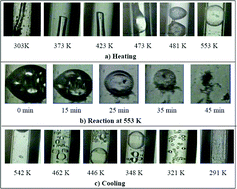Hydrolysis of polycarbonate in sub-critical water in fused silica capillary reactor with in situRaman spectroscopy†
Abstract
The advantages of using fused

* Corresponding authors
a
Department of Environmental Engineering, Zhejiang University of Technology, Hangzhou, P.R. China
E-mail:
panzhiyan@zjut.edu.cn
Fax: +86 571-88320061
Tel: +86 571-88320061
b U.S. Geological Survey, Reston, VA, USA
The advantages of using fused

 Please wait while we load your content...
Something went wrong. Try again?
Please wait while we load your content...
Something went wrong. Try again?
Z. Pan, I. Chou and R. C. Burruss, Green Chem., 2009, 11, 1105 DOI: 10.1039/B904810N
To request permission to reproduce material from this article, please go to the Copyright Clearance Center request page.
If you are an author contributing to an RSC publication, you do not need to request permission provided correct acknowledgement is given.
If you are the author of this article, you do not need to request permission to reproduce figures and diagrams provided correct acknowledgement is given. If you want to reproduce the whole article in a third-party publication (excluding your thesis/dissertation for which permission is not required) please go to the Copyright Clearance Center request page.
Read more about how to correctly acknowledge RSC content.
 Fetching data from CrossRef.
Fetching data from CrossRef.
This may take some time to load.
Loading related content
